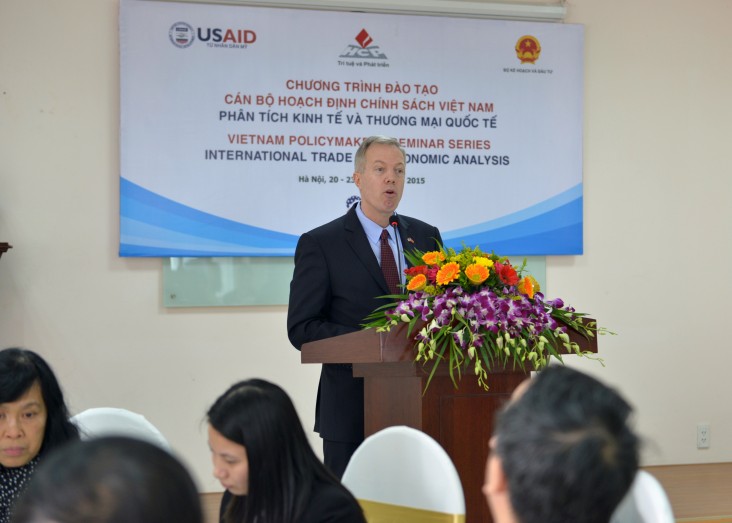
HANOI, January 20, 2015 -- Thank you Vice Minister Nguyen The Phuong for the collaboration of the Ministry of Planning and Investment (MPI). Your ministry is a key counterpart in the USAID-supported Governance for Inclusive Growth (GIG) program, as well as a key partner of the U.S. Embassy on many important issues.
And thank you also to Mr. Dao Van Hung for the leadership of MPI’s Academy of Policy and Development (APD) on the establishment of professional development programs to build the capacity of mid-level government officials to deal with important emerging policy challenges, such as those being addressed in this seminar on international trade and economic analysis.
And it’s a pleasure to see my old professor from John Hopkins SAIS, Dr. Jim Riedel, and my friend Dinh Cong Khai, Dr. Nguyen Xuan Thanh from the Fulbright Economics Teaching Program. Their involvement is a clear indication of the quality of the program you have been selected to participate in.
This inaugural Vietnam Policymakers Seminar Series is co-organized by the USAID Governance for Inclusive Growth Program (GIG) and the Ministry of Planning and Investment’s Academy of Policy Development (MPI/APD). The series of seminars has been developed to provide a platform for the exchange of ideas and best practices on policy analysis and a networking forum for mid-level Vietnamese government officials.
These seminars are meant to enhance the capacity of promising mid-level policy analysts working in government, the National Assembly and the party, in partnership with research institutions, think tanks, and universities, to develop, test and effectively communicate empirically-supported and practical policy options for senior officials’ consideration in setting the course of the nation. Ultimately, the goal of these seminars is to improve the quality of public policy making and inform a public-private dialogue on important policy issues.
I trust you had a productive first week in Vinh Phuc and look forward to hearing about it and how it relates to the work you do. But first let me take a few minutes to share with you why I think this program is a great example of how we are advancing our shared objectives under the U.S.-Vietnam Comprehensive Partnership.
As we kick off a year of celebrating the 20th anniversary of the normalization of relations between our two countries, I see several of our top priorities being supported here, including: deepening our economic ties, supporting good governance and promoting education.
The growth in our economic relationship is one of our biggest accomplishments in the past 20 years. So, it is very appropriate that this first seminar is focused on international trade. When we normalized diplomatic relations in 1995, our annual bilateral trade was just $451 million; in 2014 it approached $35 billion. As a direct result, the incomes of Vietnamese citizens have quadrupled.
And we have embarked on the next step to increase trade and further integrate Vietnam into the global economy: the Trans-Pacific Partnership free trade and investment agreement. The United States and Vietnam are firmly committed to concluding the TPP this year, providing its 12 members nearly-free access to markets that collectively account for almost 40 percent of global GDP and about one-third of all world trade. Your policy analysis work will help Vietnam prepare for and take full advantage of a final TPP agreement.
As a next generation trade agreement, TPP is not just about market access, but also about good governance. On the full range of issues addressed under the TPP --as well as under many of the other international agreements Vietnam participates in-- transparency, the rule-of-law and accountability are core principals. And, I have no doubt that you all will be having some very interesting discussions about the many intersections between trade, governance and politics this week.
USAID’s Governance for Inclusive Growth program supports these new challenges; from more results-oriented, evidence-based policymaking, to strengthened private sector and citizen feedback mechanisms on the effectiveness of policy implementation, to identifying the special considerations necessary to assure that Vietnam’s new prosperity is inclusive.
The kind of educational partnership represented in this room is also something I am eager to promote during my time as Ambassador to Vietnam. This seminar has brought together one of America’s great international relations programs (SAIS), with Vietnam’s most successful economics training programs (FEPT), together with the Academy of Policy and Development to create new programs designed to meet the many public sector challenges.
USAID is committed to organizing at least one of these emerging policy seminars each year for the next several years. And efforts like this will soon get a significant boost with the establishment of the Fulbright University of Vietnam, the country’s first American-style private, non-profit university.
I look forward to our discussion over lunch and wish you a most productive second week together.
Xin cam on.







Comment
Make a general inquiry or suggest an improvement.